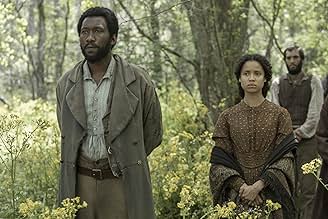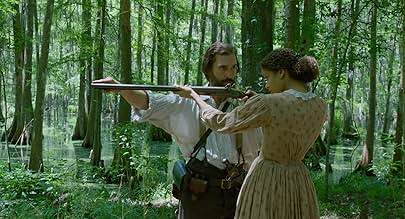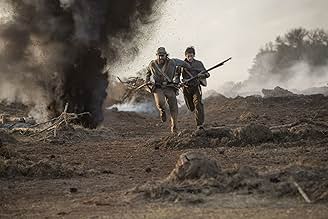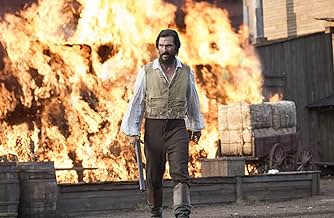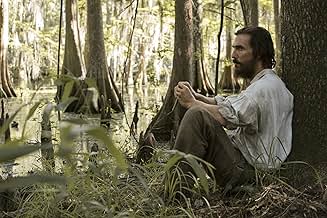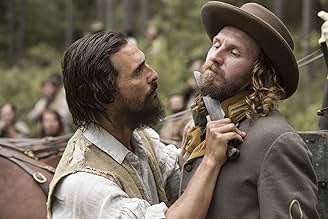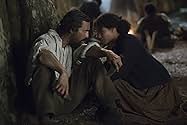Free State of Jones
Un désenchanté désabusé déserteur de l'armée confédérée retourne au Mississippi et dirige une milice de déserteurs et de femmes dans un soulèvement contre le gouvernement confédéré local cor... Tout lireUn désenchanté désabusé déserteur de l'armée confédérée retourne au Mississippi et dirige une milice de déserteurs et de femmes dans un soulèvement contre le gouvernement confédéré local corrompu.Un désenchanté désabusé déserteur de l'armée confédérée retourne au Mississippi et dirige une milice de déserteurs et de femmes dans un soulèvement contre le gouvernement confédéré local corrompu.
- Récompenses
- 3 victoires et 4 nominations au total
Jessica Ann Collins
- Annie
- (as Jessica Collins)
Donald Elise Watkins
- Wilson
- (as Donald Watkins)
Histoire
Le saviez-vous
- AnecdotesIn 2016 a document was discovered in the National Archives which was a request by Newton Knight's company to join the Union Army in 1864. It lends validity to Knight's claims.
- GaffesWhen the plantation owner comes back home after the war and walks through the front door you can see a thermostat on the wall to his left.
- Citations
Will Sumrall: [referring to Daniel] He died with honor.
Newton Knight: No, Will, he just died.
- ConnexionsFeatured in The History of Jones County (2016)
- Bandes originalesBeautiful Dreamer
Written by Stephen Foster
Commentaire à la une
I had read Prof. Bynum's excellent books about the Jones County rebellion and so had been looking forward to the movie. Though it, inevitably, changes the story (you'd need a dozen hours to tell it completely), it remains faithful to the spirit of the rebellion and the characters of Newton and Rachel Knight.
There were a number of Unionist uprisings in the South during the Civil War (a fact that was carefully expunged from my history textbooks, growing up in the South, maybe to justify all the monuments celebrating the glorious Olde South that lurk around public parks and buildings to intimidate black Southerners - I guess). What other purpose could they possibly serve? To celebrate a defeat?
This movie finally points out the obvious: the Confederacy lost the war, but the planter class which owned the Confederacy did their damnedest to win the peace. Instead of being lynched like Mussolini, Confederate leaders returned to their lives, their plantations, just like the war had never happened. Even the slaves they lost were returned to them in the form of unpaid sharecroppers. The misery of the lives of freedmen is one of the strongest images to take away from this film, their alleged freedom snatched from them. No 40 acres and a mule to serve as some form reparation, they went on to endure a century of domestic terrorism at the hand of the KKK.
The movie itself is beautifully and sensitively acted and filmed. There are scenes of great brutality but which are never gratuitous. There are also scenes of great beauty. There are scenes which have enormous relevance to politics in America today where racism is the hallmark of one Presidential candidate and income inequality the hallmark of another.
Claims by the radical left that this movie is about a "white savior" are just silly. If anything, Gary Ross has eliminated most of the real-life incidents which dealt with Newton Knight's own actions on behalf of freedmen, probably to make the film more palatable to the radical left who, like the extreme right-wing can never be satisfied anyway. I do wish the radical left, rather than criticizing well-intentioned liberals like Gary Ross, would attack the real enemy. The State of Mississippi still incorporates the Confederate flag in its state flag... and social justice warriors are quibbling about degrees of "white saviordom"?
Matthew McConaughey hasn't put a foot wrong since Lincoln Lawyer and his performance here is among his best work. American actors are rarely convincing playing period roles but he totally inhabits the role - scraggly beard, greasy hair, terrible teeth and attitude. He looks like the daguerrotype of a tired and desperate Civil War soldier. Gugu Mbatha-Raw has flown too long under the radar: stunningly touching as an early 19th century biracial heiress in Belle and totally believable as a pop star headed for a nervous breakdown in Beyond the Lights, she brings a luminous quality to Rachel a resourceful woman who defined her own path despite the oppression of racist Southern culture.
Mahershala Ali's character won't be found in Prof. Bynum's books. The names of the maroons who fought with the Knight Company have been lost to history, so he is a composite character invented by Gary Ross. His character travels from runaway slave to armed insurgent to voting rights activist in Reconstruction. Ali imbues his character with wit, charm, warmth and extraordinary courage.
Keri Russell is fine in a small role. She gives her heartbroken character dignity and resilience.
Highly recommended.
There were a number of Unionist uprisings in the South during the Civil War (a fact that was carefully expunged from my history textbooks, growing up in the South, maybe to justify all the monuments celebrating the glorious Olde South that lurk around public parks and buildings to intimidate black Southerners - I guess). What other purpose could they possibly serve? To celebrate a defeat?
This movie finally points out the obvious: the Confederacy lost the war, but the planter class which owned the Confederacy did their damnedest to win the peace. Instead of being lynched like Mussolini, Confederate leaders returned to their lives, their plantations, just like the war had never happened. Even the slaves they lost were returned to them in the form of unpaid sharecroppers. The misery of the lives of freedmen is one of the strongest images to take away from this film, their alleged freedom snatched from them. No 40 acres and a mule to serve as some form reparation, they went on to endure a century of domestic terrorism at the hand of the KKK.
The movie itself is beautifully and sensitively acted and filmed. There are scenes of great brutality but which are never gratuitous. There are also scenes of great beauty. There are scenes which have enormous relevance to politics in America today where racism is the hallmark of one Presidential candidate and income inequality the hallmark of another.
Claims by the radical left that this movie is about a "white savior" are just silly. If anything, Gary Ross has eliminated most of the real-life incidents which dealt with Newton Knight's own actions on behalf of freedmen, probably to make the film more palatable to the radical left who, like the extreme right-wing can never be satisfied anyway. I do wish the radical left, rather than criticizing well-intentioned liberals like Gary Ross, would attack the real enemy. The State of Mississippi still incorporates the Confederate flag in its state flag... and social justice warriors are quibbling about degrees of "white saviordom"?
Matthew McConaughey hasn't put a foot wrong since Lincoln Lawyer and his performance here is among his best work. American actors are rarely convincing playing period roles but he totally inhabits the role - scraggly beard, greasy hair, terrible teeth and attitude. He looks like the daguerrotype of a tired and desperate Civil War soldier. Gugu Mbatha-Raw has flown too long under the radar: stunningly touching as an early 19th century biracial heiress in Belle and totally believable as a pop star headed for a nervous breakdown in Beyond the Lights, she brings a luminous quality to Rachel a resourceful woman who defined her own path despite the oppression of racist Southern culture.
Mahershala Ali's character won't be found in Prof. Bynum's books. The names of the maroons who fought with the Knight Company have been lost to history, so he is a composite character invented by Gary Ross. His character travels from runaway slave to armed insurgent to voting rights activist in Reconstruction. Ali imbues his character with wit, charm, warmth and extraordinary courage.
Keri Russell is fine in a small role. She gives her heartbroken character dignity and resilience.
Highly recommended.
Meilleurs choix
Connectez-vous pour évaluer et suivre la liste de favoris afin de recevoir des recommandations personnalisées
- How long is Free State of Jones?Alimenté par Alexa
Détails
- Date de sortie
- Pays d’origine
- Sites officiels
- Langue
- Aussi connu sous le nom de
- Lucha por la libertad
- Lieux de tournage
- Sociétés de production
- Voir plus de crédits d'entreprise sur IMDbPro
Box-office
- Budget
- 50 000 000 $US (estimé)
- Montant brut aux États-Unis et au Canada
- 20 810 036 $US
- Week-end de sortie aux États-Unis et au Canada
- 7 572 206 $US
- 26 juin 2016
- Montant brut mondial
- 25 035 950 $US
- Durée2 heures 19 minutes
- Couleur
- Rapport de forme
- 1.85 : 1
Contribuer à cette page
Suggérer une modification ou ajouter du contenu manquant

Lacune principale
By what name was Free State of Jones (2016) officially released in India in Hindi?
Répondre






